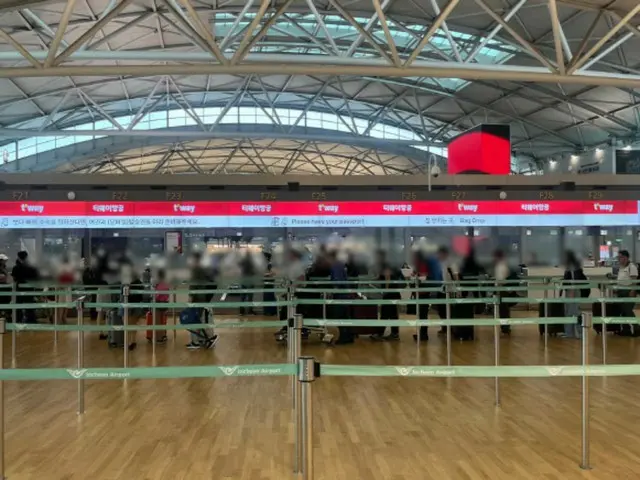Five days have passed since the release of treated water from the Fukushima nuclear power plant began on the 25th, but in South Korea
There hasn't been a "No Japan" whirlwind like when it was removed from the whitelist in 2019. In particular, the demand for overseas travel, which has been restrained due to the spread of the COVID-19 virus, is currently
Many people, not only those who are concentrated in Japan, but also those who consume Japanese products, said that "personal choice should be prioritized." Based on the experience of the No Japan movement, the experts
, analyzes that each person's consumption and values are respected. At Terminal 1 of Incheon Airport, which I visited on the 30th, there were tourists even though it was a weekday morning.
Seen a lot. There were as many as five flights an hour bound for Tokyo, Fukuoka, Kumamoto, Takamatsu, and other places in Japan, and there were long lines of tourists waiting to go through the formalities.
The discharge of treated water from the Fukushima Daiichi Nuclear Power Plant into the ocean began on the 25th, and negative perceptions of Japan increased, but people who chose "freedom of choice" over the "No Japan Movement" decided to travel to Japan.
I'm on my way. Mr. Chu (32), an office worker who is going on a trip to Fukuoka for 3 nights and 4 days starting from this day, said, ``It's not like I had any hesitation, but it's been a long time since I've been on a trip.''
I decided to go because the people around me weren't in a particular mood to hold off on my trip," he said, adding, "If (treated water) has already begun to be released into the ocean, I think it's important to avoid the impact in both South Korea and Japan.
I think it's the same as not being able to do it." Mr. Lee, who is in his 50s and heading to Okinawa, said, ``I'm more worried about the No Japan movement because there's news that it's going to rain this weekend and a typhoon is coming.''
``Even though I had purposely chosen to go during the summer vacation season and mid-autumn celebration season when there were fewer people, it was difficult to make reservations for rental cars.''
Japan's popularity among Koreans traveling abroad is proven by statistics. According to the Japan National Tourism Organization (JNTO), the number of foreign tourists who came to Japan from January to July this year was 1.
There were 3,032,900 people. Of these, 3,755,300 tourists were Koreans, making up one in three tourists and ranking first among nationalities. Especially in July, the number of Korean tourists exceeded 600,000 for the first time.
broke. Even though discussions about releasing treated water into the ocean began after the Japan-Korea summit meeting in May, the number of tourists has steadily increased.
In fact, Japan is currently the most popular travel destination in South Korea. from 1 hour
This is because the short flight time of about two hours and the historically weak yen, which hovers around 900 won per 100 yen, makes the trip cheaper. Mr. A, an office worker who went on a trip to Japan last week (3
0) said, ``I went to Osaka, and I could hear Korean at every restaurant I went into,'' adding, ``It's cheaper than domestic tourist spots such as Cheju Island, and it's a great place to go overseas.'' I want to
I think there is a good reason," he said. Thanks to travel demand, air flights are also brisk. According to the Incheon Airport Corporation, the number of flights to and from Japan in the past month reached 6,845.
It was the most frequently operated international route. This includes not only China (flight 5380) and the United States (flight 3196), but also Southeast Asia, which is a popular summer vacation destination such as Thailand, Vietnam, and the Philippines.
This is a figure that exceeds that of airmail. Mr. Terada (43) from Chiba Prefecture said, ``At the time of the Great East Japan Earthquake in 2011, I felt it was serious, but these days I don't feel like there are any particular problems in commuting.''
talked. Even in products and industries that were subject to boycott campaigns in 2019, such as Japanese beer and Uniqlo, there seems to be no noticeable change. According to the Customs Service, 2019
The import volume of Japanese beer in 2017 was 47,331 tons, which was half the level of the previous year, but last month it rose to the top with a 27.1% share of the total beer import volume. "Asahi Super
- Dry canned beer and highballs made by mixing whiskey and carbonated water remain popular. A UNIQLO store in Songpa-gu, Seoul prepares autumn clothes
The staff noticed. Experts had the effect of "learning" from being criticized and criticized for the consumption of others during the "No Japan Movement" in 2019.
I am analyzing. Professor Lee Eun-hee of the Department of Consumer Affairs at Inha University said, ``In 2019, questions were raised as to whether it was correct to link political and diplomatic issues with consumption.
"I learned about the need to respect the choices that individuals make based on their consumption and values," he said, adding, "Even if treated water begins to be released into the ocean, people will continue to prioritize the values they value when making choices." hand
"There is," he explains.
2023/08/31 07:26 KST
Copyrights(C) Edaily wowkorea.jp 107

